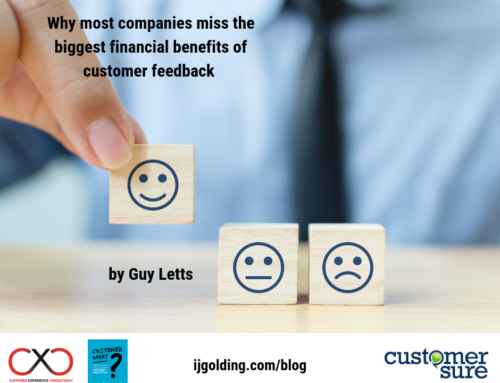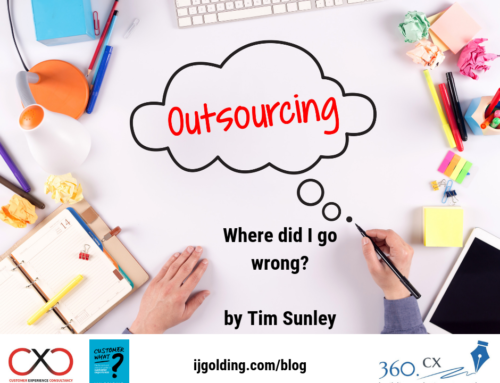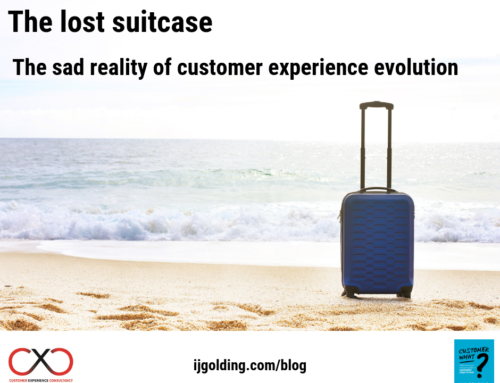
I have often wondered how bad things need to be for organisations to recognise that they have a problem. Hopefully it is not at the point that there is a loud knock on the door with a large van outside waiting to remove valuables from head office! In a world where most large companies profess to ‘listen to their customers’ and where CEOs confidently talk about their NPS (Net Promoter Score), why is it that on so many occasions, we the humble customer feel ignored? It is quite amazing to find on a daily basis, more and more examples of customer dissatisfaction being publicly expressed via Facebook and Twitter – businesses do not even need to pay to get feedback on their products and services – it is out there for all to see.
It does sometimes appear that companies who experience the full force of customer anger hope that if they shut their eyes for long enough, the problem will just go away. If they put their heads in the sand, or their fingers in their ears, there may just not be a problem any longer. Of course I am being rather sarcastic and cynical, but examples of corporate ignorance and inactivity keep building up to make the argument rather plausible.
Perhaps one of the greatest examples of a company failing to listen is United Airlines. Over 13 million people have now viewed a video on YouTube that was the result of a very disgruntled customer feeling that they had no choice but to write a song about his experience with the company. Dave Carroll, a Canadian musician, witnessed his expensive Taylor guitar being broken by United Airlines staff. The inability of the airline to acknowledge the issue, and take appropriate action led to him penning the song ‘United Breaks Guitars’. 13 million views on YouTube demonstrate that the story has become a case study for customer experience professionals all over the world. United Airlines share price plummeted – but why did a customer have to go to these lengths to be listened to? If you have not seen the song, you must watch it, and can do so here https://www.youtube.com/watch?v=5YGc4zOqozo

Another example from the US is maybe even more dramatic. JC Penney, one of the countries largest retailers had to issue a public apology in May this year following a catastrophic set of decisions. Their new CEO, Ron Johnson who had been poached from Apple, oversaw a number of changes to a very traditional American brand. The changes were made with little if any consultation with customers. They were changes that led to the company losing over $4 billion in revenue during Ron Johnson’s time at the helm (http://www.forbes.com/sites/clareoconnor/2013/05/01/j-c-penney-releases-apology-ad-begging-shoppers-to-come-back/). Once Johnson had departed, the company’s leadership team felt they had no choice but to apologise for failing to listen to customers. A nationwide TV advertising campaign acknowledged the mistakes, apologised and said ‘we’ve listened’. It is quite astonishing. Can you imagine if that happened to your company? Why did it take so long to realise that there was such a big problem? Why did it happen in the first place? If you have not seen the advert, you must watch it, and can do so here – https://www.youtube.com/watch?v=SBkKJdKrhCY

JC Penney customers were lucky – they could very easily demonstrate their dissatisfaction and disdain towards the actions of the company by ‘voting with their feet’. It was only at the point that there were almost no feet left in the stores, that the company decided to do something about it. Not all customers are as lucky. Yesterday, I noticed a post on Facebook from an old university friend of mine. The post was as follows:
When I receive poor customer service I usually try to give constructive feedback however there is nothing more I can say about how awful EE is as a network! I am 6 months into a 2 year contract with a phone that does not work and a provider whose staff tell me “my team leader does not want to deal with you right now”. Hopefully tonight’s watchdog program will do some damage to them. In the meantime I’d greatly appreciate your signatures on a petition to force them to give a better service.http://www.ipetitions.com/petition/justice-for-ee-customers/
Just to clarify, my friend did not instigate the petition. She found it, and is now promoting it to her friends and family. She used to run customer service teams and so knows the pressures of having to deal with complaints on a daily basis. EE stands for Everything Everywhere. EE is a mobile network operator and internet service provider company and is the largest mobile network operator in the UK, with around 27 million customers.It operates under the EE, Orange and T-Mobile brands and currently only offers its services within the UK. EE is a 50:50 joint venture between Deutsche Telekom and Orange S.A., formed in 2010 through the merger of their respective T-Mobile and Orange businesses in the UK. This is what the company claims about its products and services on its website:
We aim to deliver the UK’s best service, through our websites and customer service apps, over the phone and in-store. We have over 11,000 customer service and retail employees who are trained experts in mobile device operating systems. Every year, our service centres teams have over 86 million conversations with our customers, and more than 40 million customers come through the doors of our more than 700 retail stores. Online, we have over 35 million visits per month to our websites
The numbers are staggering. However my friends Facebook post suggests that the claim and the reality are very different. Her experiences have pushed her to the point of almost no return. The difference between her and a JC Penney customer is that she cannot just as easily ‘vote with her feet’. As many of EE’s 27 million customers are tied in to a contract, they cannot just walk away. That is why she, and a dozens of other customers have gone to the lengths of signing a petition to get their voice heard. A petition!!!!!! Why should a customer of a company have to feel that this is what they have to do to get the company to listen to them? How bad does it really have to be? The noise about EE is growing. Customer sentiment is being aired in consumer TV programmes, media reports, and thousands and thousands of them are turning to social media to express their feelings. So why is nothing changing? Why are the company not responding?
When their contracts reach a conclusion, many EE customers will leave them – for good. Their competitors are almost certainly rubbing their hands together with glee. A company that today has 27 million customers is at serious risk of seeing that number drop like a stone. I have no sympathy for them. None of us should ever let things get to the point where a customer feels that they have to create a petition to get you to listen to them. Things should never, ever get that bad. Listening to our customers continuously MUST be an integral part of our DNA. It must be an essential ingredient into the strategic decision-making process for our organisation. When I showed the draft of this blog post to my university friend, she shared this with me:
The issues I have with EE have been going on a long time, it finally got to me in an emotional sense last week when my 11-year-old son started at senior school and said ‘I tried to call you to tell you how my day went but I couldn’t get through, I wanted to speak to you’
Stating the obvious, without our customers there is no company. EE executives could do well to remember that. Leaders of all businesses should ensure that everyone in their organisation remembers that. Customers are our lifeblood, they pay our salaries. They need to be looked after and cared for. Failure to treat customers with the respect they deserve could ultimately spell disaster for your company.
Are you an EE customer? Have you reached the point of no return with another company? I’d love to hear your point of view.






I agree with Ian, EE company service is appalling but I have a contract. This contract expires in January next and EE will not see me for dust again.
[…] an article that I had been sent last week, from somebody who had read these blogs. He wrote of his own experience, and somewhere in there or on some other social media site, I had noticed that EE was being […]